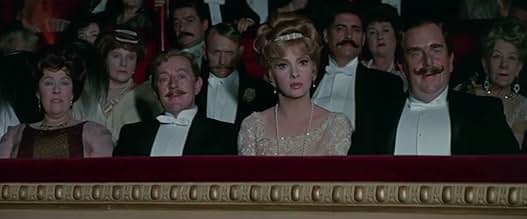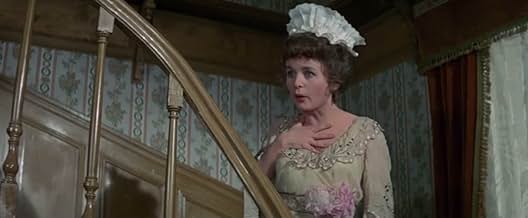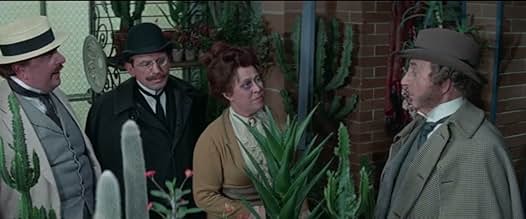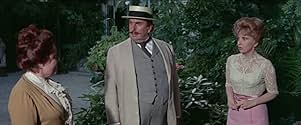A writer observes 1900s Paris couples a dominant wife's husband and a neglectful spouse with his beautiful wife whose affairs collide at Hotel Paradiso, along with family and staff, during a... Read allA writer observes 1900s Paris couples a dominant wife's husband and a neglectful spouse with his beautiful wife whose affairs collide at Hotel Paradiso, along with family and staff, during an ill-timed police raid.A writer observes 1900s Paris couples a dominant wife's husband and a neglectful spouse with his beautiful wife whose affairs collide at Hotel Paradiso, along with family and staff, during an ill-timed police raid.
- M. Martin
- (as Douglas Byng)
- Hotel Guest
- (as Edra Gale)
- Policeman in Hotel
- (uncredited)
- Policeman in Hotel
- (uncredited)
- Policeman in Hotel
- (uncredited)
Featured reviews
Hotel Paradiso
Fun to watch.
Thing that I liked about this movie was that it was being perfectly silly. It really wasn't afraid to truly go over-the-top at times, with its characters and situations. Some of the comedy makes absolutely no sense in the context of the story but that actually made it all the more hilarious to watch. Yes, this truly is a movie that made me laugh a couple of times and therefore I can also do nothing else but to consider this movie a good and a successful one, at what it was trying to achieve.
You could definitely still complain about the story itself though. Of course its being quite simplistic but what is all the worst is that you are supposed to root for a man and woman who are cheating on their wife and husband. It felt a bit weird to me, no matter how obnoxious and uptight the wife and husband of the two were.
But still, this obviously isn't a movie you should take very seriously or think too much about. You should simply enjoy it for what is is and you should definitely be able to do so, thanks to its great comical situations and actors involved.
The acting is definitely really stagy-like but this obvious suits the genre and you will start to feel accustomed to it, after a few minutes in already. And Alec Guinness, Gina Lollobrigida, Robert Morley and all of the others really succeed in making their characters work out as greatly comical ones, who get themselves more and more into trouble, no matter how hard they try to get out of it.
This is very typical for a farce of course. It begins with a simple situation and setup but slowly and steadily things start to go from bad to worse for the characters, when more and more different characters show up, in the hotel Paradiso. The comedy even turns really slapstick at times which was definitely silly but still fun to watch at the same time.
It all made me laugh, so this movie definitely served its purpose well enough for me, though I can still recognize it as a not very great movie.
7/10
http://bobafett1138.blogspot.com/
Great fun!
Superior filming of superior stage farce
Nine years later, the same Peter Glenville brought his superb adaptation to the screen for MGM with Alec Guinness in the Bert Lahr role and Gina Lollorigida bringing her all too seldom seen comic timing (check out her wonderful 1961 boulevard comedy "Come September" with Rock Hudson and Walter Slezak) to the Angela Lansbury role. Even Broadway cast member Douglas Byng (as Martin, a barrister) was along for the fun.
Of COURSE the plotting is "strained" - that is virtually the definition of farce - but the laughs flow without reservation.
Americans don't often get to see good European style farce which relies on situations, intellect and language as much as physical comedy. When we DO get a great farce like "Arsenic and Old Lace" or Noises Off", it is usually devoid of all sexual content - as if sex (not dirt, but good clean sex with all the ironies and insecurities attendant) weren't among the greatest sources of farcical situations.
Glenville gives us Feydeau at his most elegant - which is to say unashamedly sexual (with would-be adulterous spouses, potential lovers and innocents in a waltz of slamming doors and crowded corridors at the titular hotel), at the same time keeping the proceedings intrinsically moral and (for those foolish enough to care) absolutely clean.
The Belle Epoche settings fairly sing with civilized delight, and the brilliant farceurs like Robert Morley and Derek Fowlds (later known for his third lead in the brilliantly observed "Yes, Minister" and "Yes, Prime Minister" TV series) join the leads in a collective tour de farce.
Watch for Glenville himself in the unbilled role of Feydeau, observing and "writing" the proceedings, but by all means watch. This is all a stage to film transfer should be. You'll have a lovely time and feel the better for it.
Very, um, French
Certainly, the film displays great production values, and fine acting, but unless you truly love the genre, the interest level grinds to a complete halt by mid-point. Why it supposedly requires great intellect to comprehend the "farce," I'll never know. Add Tootie and Blair, and you have "The Facts of Life Goes to Paris." I'll take good, solid repartee between Hepburn and Tracy any old day. Silliness simply does not suffice.
Did you know
- TriviaDerek Fowlds, who played Maxim, recalled how one day on set, he told Gina Lollobrigida she had "the most beautiful eyes he had ever seen." She simply looked him up and down and walked off and never spoke to him again. Alec Guinness also disliked Ms. Lollobrigida, and the two rarely, if ever, spoke.
- GoofsThe women do not wear the correct type of shoe. In this period - late Victorian to WWI - women wore high buttoned boots as daily wear.
- Quotes
Benedict Boniface: I'll show you what a man should be. Strong, tender and terrible in his passion.
Marcelle Cot: Well, Monsieur Boniface! You may be rather plain, but you certainly have a way with women!
- ConnectionsFeatured in Discovering Film: Gina Lollobrigida (2015)
- SoundtracksMain Title
Written by Laurence Rosenthal
- How long is Hotel Paradiso?Powered by Alexa
Details
- Runtime
- 1h 38m(98 min)
- Aspect ratio
- 2.35 : 1
































